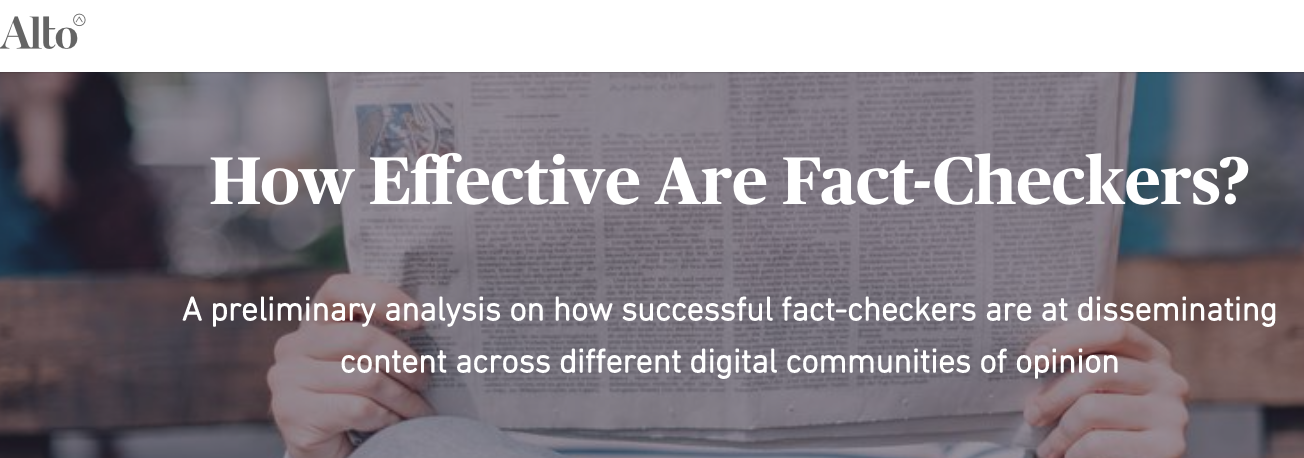
As “fake news” continues to plague digital socio-political space, a new form of investigative reporter has risen to combat this disinformation: the fact-checker. Generally, fact-checkers are defined as journalists working to verify digital content by performing additional research on the content’s claim. Whenever a fact-checker uncovers a falsity masquerading as fact (aka fake news), they rebut this deceptive representation through articles, blog posts, and other explanatory comments that illustrate how the statement misleads the public. [More from Reuters] As of 2019, the number of fact-checking outlets across the globe has grown to 188 across 60 countries, according to the Reporters Lab.
But recent research reveals that this upsurge in fact-checkers may not have that great an impact on defeating digital disinformation. From December 2018 to the European Parliamentary elections in May 2019, big-data firm Alto Data Analytics collected socio-political debate data from across a variety of digital media platforms. This survey served as one of the first studies assessing the success of fact-checking efforts. Alto’s study examined five European countries: France, Germany, Italy, Poland, and Spain. Focusing on verified fact-checkers in each of these countries, Alto’s Alto Analyzer cloud-based software tracked how users interacted with these trustworthy entities in digital space. Basing their experiment exclusively on Twitter interactions, the Analyzer platform recorded how users interacted with the fact-checkers’ tweets through re-tweets, replies, and mentions. After noting this information, the data-scientists calculated the fact-checkers’ effectiveness in reaching communities most affected by disinformation.
Despite its limitation to 5 select countries, the study yielded discouraging results. In total, the fact-checking outlets in these countries only amounted to between 0.1% and 0.3% of total number of Twitter activity during the period. Across the five countries in the study, fact-checkers penetrated least successfully in Germany, followed closely by Italy. Conversely, fact-checkers experienced the greatest distributive effect in France. Fact-checkers’ digital presence tended to reach only a few online communities. The study found that “fact-checkers . . . [were] unable to significantly penetrate the communities which tend to be exposed most frequently to disinformation content.” In other words, fact-checking efforts reached few individuals, and the ones they did reach were other fact-checkers. Alto Data notes, however, that their analysis “doesn’t show that the fact-checkers are not effective in the broader socio-political conversation.” But “the reach of fact-checkers is limited, often to those digital communities which are not targets for or are propagating disinformation.” [Alto Data study]
Alto proposed ideas for future research models on this topic: expanding the study beyond one social media site; conducting research to find effectual discrepancies between various types of digital content—memes, videos, picture, and articles; taking search engine comparisons into account; and providing causal explanations for penetration differences between countries.
Research studies in the United States have also produced results doubting the effectiveness of fact-checkers. A Tulane University study discovered that citizens were more likely to alter their views from reading ideologically consistent media outlets than neutral fact-checking entities. Some studies even suggest that encounters with corrective fact-checking pieces have undesired psychological effects on content consumers, hardening individuals’ partisan positions and perceptions instead of dispelling them.
These studies suggest that it's incredibly difficult to "unring the bell" of fake news, so to speak. That is why the proactive efforts of social media companies and online sites to minimize the spread of blatantly fake news related to elections may be the only hope of minimizing its deleterious effects on voters.